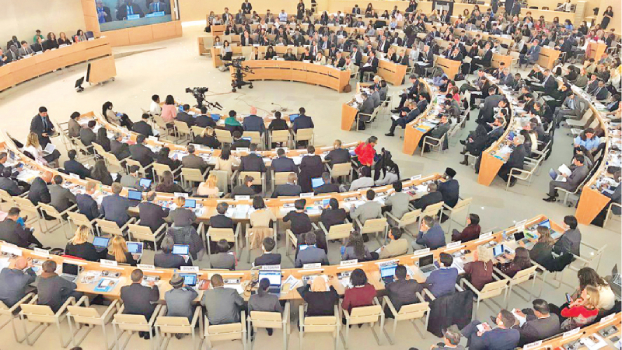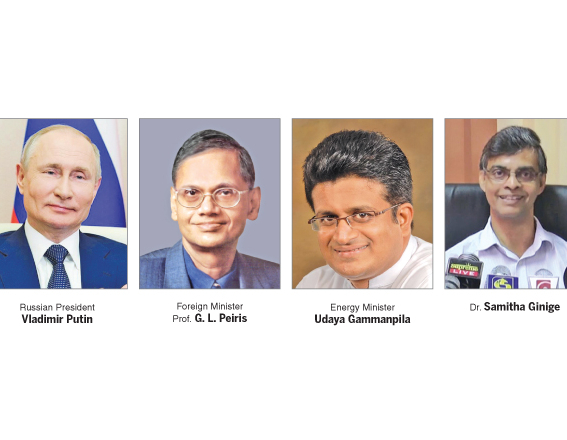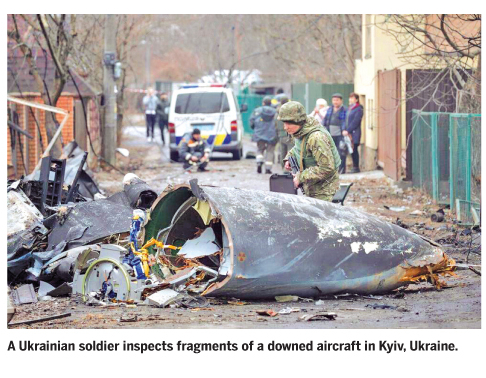
Please Share your Email if you Wish to Receive the Golden Tips & Tales Newsletter from History of Ceylon Tea Website



The world was taken by surprise last week when Russian President Vladimir Putin ordered his troops across the border into neighbouring Ukraine, an action that will have ramifications for Sri Lanka’s economy which, while recovering from the COVID pandemic faces the challenge of an electricity shortage.
The events in Ukraine also cast a shadow over the ongoing sessions of the United Nations Human Rights Council (UNHRC) in Geneva where Sri Lanka is also on the agenda for discussion and is being represented by a high-powered delegation led by Foreign Minister Prof. G. L. Peiris.
The impact of the unfolding crisis in Ukraine and the difficulties in ensuring an uninterrupted power supply also appear to have negated the gains Sri Lanka has made in its own war against the Coronavirus pandemic over the past two years which led to prolonged lockdowns lasting several months.
Relaxed guidelines
Issuing new guidelines applicable from March, the Ministry of Health has lifted restrictions and full capacities have been allowed for almost all events except for weddings. Limits on capacity for shops, restaurants, supermarkets, banks, cinemas, sports events and tuition classes have now been lifted.
Also lifted are restrictions on numbers that could attend a funeral. However, limited capacity is still in effect for private gatherings, weddings and exhibitions where a maximum of 75 per cent of the usual capacity is allowed. These regulations reflect the improving situation in the pandemic, officials said.
Authorities have also decided that fully-vaccinated travellers are allowed to visit the island without the need for a negative swab test (PCR or RAT) result from March. However, partially-vaccinated or unvaccinated tourists are still required to submit a negative swab test result within 72 hours of their arrival date.
This is despite the Omicron variant of the Coronavirus seeping through the country. The number of daily COVID-19 cases has surpassed 1,000 for 27 consecutive days since January 30. Health authorities say Sri Lanka had only a mild impact due to the variant, mostly because of high vaccination rates.
“It is true that infections, hospitalisations, Intensive Care Unit (ICU) admissions and oxygen dependency rose considerably in February. However, this increase was manageable within the resources of our health system,” Dr. Samitha Ginige, Director of the Epidemiology Unit of the Ministry of Health said.
Dr. Ginige however advised that the public should remain cautious and vigilant and strongly urged that the booster (third) dose of the vaccination be complied with. The virus is constantly evolving and is still a cause for concern and any lag in the uptake of the booster could escalate infections, he said.
In Geneva meanwhile, Sri Lanka was fighting a different kind of battle on the diplomatic front at the ongoing sessions of the UNHRC. Foreign Minister Prof. Peiris addressed the UNHRC’s High Level Segment, strongly reiterating the country’s commitment to human rights and democratic freedoms.
Minister Peiris was also critical of the UNHRC’s mechanism of gathering evidence. “Such initiatives create disharmony both in the domestic and international arenas. It creates obstacles to reconciliation efforts, breeds hatred by reopening past wounds and polarises society,” the Minister told the UNHRC.
Minister Peiris also referred to the proposed changes to the Prevention of Terrorism Act (PTA). The changes to the PTA are being proposed 43 years after it was enacted, the Minister noted. The changes endeavour to strike a just balance between human rights and national security needs, the Minister said.
Sri Lanka believes counter-terrorism legislation must secure and protect the rights of persons subject to investigation, detention and trial but must not restrict the freedom of expression, Minister Peiris said. The Council’s interactive dialogue on issues related to Sri Lanka has been listed for tomorrow.
Arguably of more immediate concern to the Government was the fast-developing conflict between Russia and Ukraine which could adversely impact Sri Lanka’s economic recovery after two years of relative stagnation brought about due to the restrictions necessitated by the COVID-19 pandemic.
Russia and Ukraine conflict
Both Russia and Ukraine are significant buyers of Sri Lanka’s tea exports. They are also a valuable contributor to Sri Lanka’s tourism industry. The war in Ukraine will necessarily reduce their engagement with Sri Lanka at a time Colombo is eager for trade to boost its foreign reserves.
In a related development, the Government has decided to extend the visas of Russian and Ukrainian tourists in the country by two months free of charge. While there is no war in Russia itself, most airlines have stopped flights to Russia due to Western bans and Russian carriers too are barred from reaching many airports. This has created difficulties for Russian tourists seeking to get back home. Ukrainians cannot, of course, travel there due to the war situation and there are no flights in any case. Records indicate that over 11,000 Russian tourists and nearly 4,000 Ukrainian tourists are in Sri Lanka. As mentioned above, they may have difficulties returning to their countries.
The Government was also concerned for the safety of Sri Lankans in Ukraine. The Foreign Ministry said that in collaboration with embassies in Warsaw and Ankara (which is accredited to Ukraine), it is currently engaged in the evacuation of about 40 Sri Lankan nationals including students through the Ukraine–Poland border. This has become urgent as reports indicated that one 21-year-old Indian student has already succumbed to his injuries caused by a Russian bomb attack.
The Ministry said it continues to closely monitor developments in Ukraine and has strengthened the provision of resources to the Sri Lankan Embassy in Warsaw in order to facilitate evacuation. Sri Lankan envoys in Ankara and Warsaw are in contact with the Sri Lankans leaving Ukraine, it noted.
The Ministry also assured that the Sri Lanka Embassy in Moscow which is concurrently accredited to Belarus is in close communication with the approximately 1,600 Sri Lankan nationals, including 1,556 students studying in eight universities and higher education institutes in Belarus. Several countries have imposed sanctions on Belarus, seen as an ally of Russia.
Sri Lanka’s Ambassador in Moscow is in direct contact with the relevant university authorities, student and parent groups in Belarus, with regard to the safety and welfare of the Sri Lankan students. “Regular status updates are being provided to their parents as deemed necessary,” the Ministry said.
The Foreign Ministry also assured that it is engaged in monitoring the status of Sri Lankan nationals in countries which share land borders with Ukraine and added Sri Lanka’s accredited missions are in contact with the relevant Honorary Consuls and Sri Lankan nationals in the respective countries.
All these developments come on a background of ongoing difficulties in the local electricity supply.
This issue has come to the fore mostly due to a reduction in fuel available to generate electricity as a result of the forex crisis. Fuel powered electricity generation has remained a vital segment of Sri Lanka’s energy needs for many years. Energy Minister Udaya Gammanpila explained that, with a limited amount of foreign exchange available to the Government for the purchase of fuel due to prudent fiscal measures, power generation from fuel will be reduced. This has led to the current situation, Minister Gammanpila said.
The government spent US$ 21 billion on imports in 2021 of which US$ 2.8 billion was allocated for fuel imports, the Minister said. With limited foreign exchange at its disposal, the country needs to reduce expenses on non-essential items such as apples and oranges and prioritise the allocation of funds for essential imports, he said.
The current shortages of fuel in the country have also led to some panic buying by motorists and others. This has caused long queues at some fuel stations. This is also because the price of fuel is significantly cheaper at Ceylon Petroleum Corporation (CPC) outlets in comparison to those of the Lanka India Oil Company (LIOC) which recently raised prices again.
In a bid to ease these difficulties, the Government this week prioritised the import of 1.8 million barrels of unleaded 92 Octane petrol. Cabinet approval was granted for this which will occur over an eight-month period until October this year through a company based in the United Arab Emirates (UAE).
Power supply
Bids had been called from registered suppliers and temporarily-registered suppliers for a long-term contract to import petrol. Cabinet approval was given to a proposal by the Energy Minister to award the contract in accordance with standard procurement procedures, a Government announcement said.
The Government has for some time now strenuously resisted attempts to introduce power cuts. It was able to do so for the past several months mostly to ensure that the revival of the economy after the COVID-19 pandemic was not hampered by shortages in electricity and its follow-on effects.
However, given the current difficulties in ensuring adequate fuel supplies and an ever-increasing demand for fossil fuels in the country, it is no longer in a position to ensure an uninterrupted power supply. As a result, scheduled power cuts in selected regions at a given time commenced two weeks ago.
These interruptions to power supply will now last for seven hours and thirty minutes per day (at the time of writing). The seven and half hour period is divided into two segments of five hours and two and a half hours to minimise inconvenience to the public, the Public Utilities Commission of Sri Lanka (PUCSL) has said.
The current situation in the energy sector is likely to last for some time. This is because the complex issues that have led to this situation are unlikely to ease in the short term. The Government is mindful of the inconvenience this is causing the public and is constantly reviewing all possible relief measures.
The Government is thus faced with many challenges on several fronts, just as it was hoping that respite from the COVID-19 pandemic would bring relief to the public. The coming weeks and months will be critical in determining Sri Lanka’s post-pandemic economic progress socially and economically.
Source: https://www.dailynews.lk/2022/03/03/features/273882/lanka-makes-its-case-unhrc-war-rages-ukraine
Comments
(In keeping with the objectives of this website, all COMMENTS must be made in the spirit of contributing to the history of this estate, planter or person i.e. names, dates & anecdotes. Critical evaluations or adverse comments of any sort are not acceptable and will be deleted without notice – read full Comments Policy here)